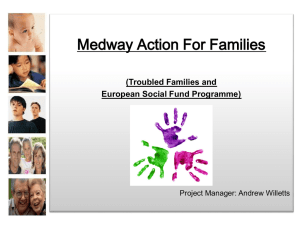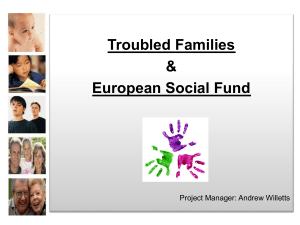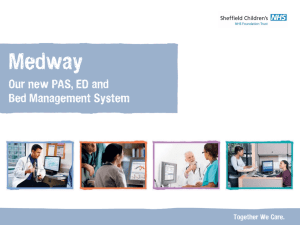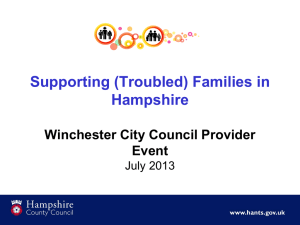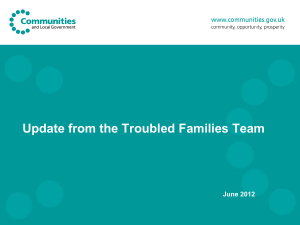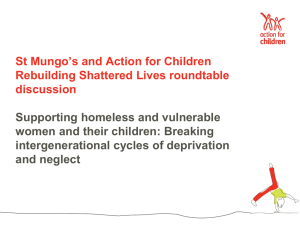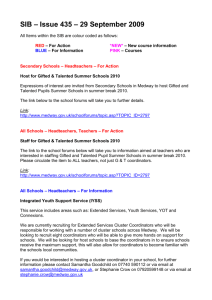Troubled Families and European Social Fund
advertisement
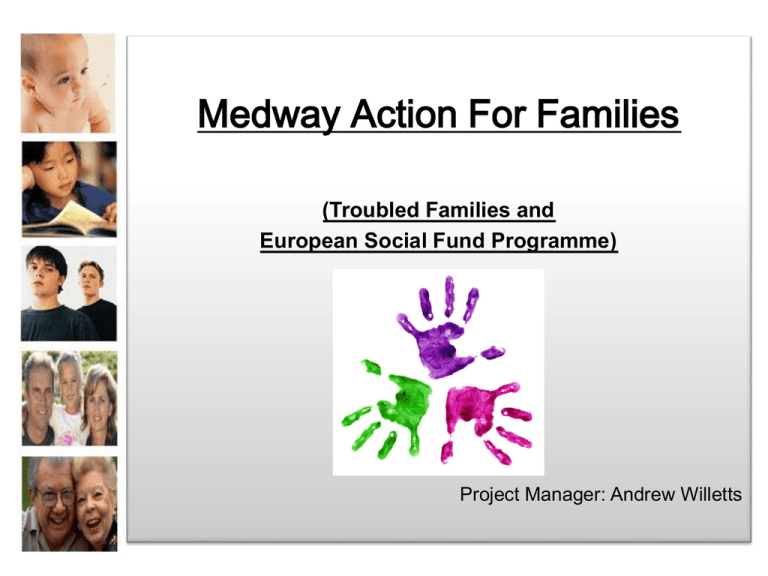
Medway Action For Families (Troubled Families and European Social Fund Programme) Project Manager: Andrew Willetts Troubled Families Background • On 15th December 2011, the Prime Minister made a speech announcing need for a “social recovery in Britain". This speech built on previous announcements following the civil disturbances of summer 2011. The Prime Minister set out that “a relatively small number of families are the source of a large proportion of the problems in society”. The Government announced that nationally an estimated £9 billion per annum is spent on 120,000 families equating to approximately £75,000 per family and identified within the overall national data that Medway has 560 troubled families. • Medway’s aim for the programme is not about a centrally prescribed delivery strategy; it is about re-redesign of local services, it is about local partners working together to identify local solutions with and for local families. Sustainable success will require leadership and engagement at a senior level by all local partners across public and voluntary sectors. • Andrew Willetts was appointed as Medway’s Troubled Families Coordinator in July 2012 having previously managed the Integrated Prevention Service (Family Intervention Programme, Targeted Youth Support, Youth Inclusion Support Programme- Triage programme and mentoring). Short term Develop a strategic group who will oversee the programme and agree the first families identified through criteria being met and develop a Targeted Team Around the Family ensuring the results for payment by result exist within the plan for the family. Develop a ‘Targeted Team Around the Family’ approach through which the family is at the centre of jointly planned strategy, tactics and operations. Agencies hold each other to account and a process akin to the CAF/ CIN/ CP would perhaps provide both coordination and necessary internal outcome audit mechanism. To provide intensive support to vulnerable families, facing multiple and complex needs, utilising multi-agency, whole family support plans and assertive working methods. To use SMART Support Plans for each family, 6 weekly reviews and formalised exit plans at the end of the service intervention, which adheres to the prescribed DSCF intensive family case work model. Long term We will conduct a ‘Cost Benefit Analysis’ on families identified to demonstrate cross directorate and interagency savings and expenditure. We will be using software to track the progress of families to evidence work to set success/ risk indicators that relate to priorities set by the DCLG. We will evidence family progress relevant to payment by results and develop a business cases for investment in the future. We will look to develop success/ risk indicators that can be adapted to suit Medway priorities. This will be integrated with national savings calculator and provision of an estimated cost saving picture for the Medway Action For Families but also for Medway as a Local Authority. Hidden Patterns a software management tool will be used along with our local data to identify gaps and future troubled families to ensure our services are best placed to work with the most vulnerable and at risk families in the future. Overview We have changed the ‘Troubled Families’ programme name to ‘Medway Action For Families’. Medway are looking to develop a virtual multi agency hub of skilled front line professionals to work on a prioritised and phased programme to directly support those families identified as ‘Troubled Families’. The aim will be to reduce the impact of harm/ cost on the community caused by certain individuals & families and their use of public services by unravelling and assessing the complex needs of problem families delivering voluntary intervention with identified families to address ongoing issues. We will set up a strategic group, in line with the requirements set by the Department of Communities for Local Government (DCLG), that can effectively address the operational challenges faced by the services supporting these families. Data collection was commissioned to Medway Youth Trust. Criteria Criteria 1: Crime and anti-social behaviour Households with one or more under 18 year old with a proven offence in the last twelve month And/or Households where one or more member has an anti-social behaviour order, anti-social behaviour injunction, anti social behaviour agreement, or where the family has been subject to a housing related anti-social behaviour intervention in the last 12 months (such as notice of seeking possession on antisocial behaviour grounds, a housing-related injunction, a demotion order, eviction from social housing on anti-social grounds) Criteria 2: Education Household where a child has been subject to permanent exclusion; three or more fixed school exclusions across the last three consecutive terms OR Is in a Pupil Referral Unit or alternative provision because they have previously been excluded; OR is not on a school roll And/or A child has had 15% unauthorised absences or more from school across the last three consecutive terms Criteria 3: Work Households which meet criteria 1 and/or 2 and which also have an adult on DWP out of work benefits – Employment & Support Allowance (ESA), Incapacity Benefit, Carer’s Allowance, Income Support and/or Jobseekers Allowance (JSA), Severe Disablement Allowance) At present The families are targeted using 3 national criteria with a fourth local criterion yet to be finalised. The following are under consideration: • Families where there is domestic violence. • Families living in the safer stronger wards (These include Luton and Wayfield, Chatham Central and Gillingham North). • Large Families (5 Children plus). • Families with children not engaging in pre-school provision (linking this work with the Children’s centres). • Families with young people 16-18 NEET where there is no adult working either. (This work will develop through 14-19 Youth Matters board- Raising the Participation Age project). • Families with Mental Health issues within the home. • Families where drugs and alcohol is a risk within the home Map of Troubled Families: Top 3 wards: Ward: Count % Chatham Central 68 11.83 Gillingham North 65 11.30 Luton and Wayfield 56 9.74 % of payment (£4000 for 5 out of 6 families). Year Upfront fee PBR • 2012-13 80% 20% £3200 £800 • 2013-14 60% 40% £2400 £1600 • 2014-15 40% 60% £1600 £2400 TF Numbers Targets Contacts August 2012- March 2013 180 April 2013 - March 2014 257 April 2014 - March 2015 123 Total 560 Upfront £480'000 £514'000 £164'000 £1'162'667 PBR £120'000 £342'666 £246'000 £703'999 Total £600'000 £856'666 £410'000 £1'866'666 What Medway’s programme is seeking to achieve: Exploring how together how we can tackle the root causes of problems to promote real and sustained changes in peoples’ lives and also look to support the community. This will be achieved by creating multi agency hubs focusing on identified families of which some will be trained to then support future programme initiatives as the programme develops. Medway’s aim for the programme is not about a centrally prescribed delivery strategy; it is about re-redesign of local services, it is about local partners working together to identify local solutions with and for local families. Sustainable success will require leadership and engagement at a senior level by all local partners across public and voluntary sectors. We are looking to support and turn around the lives of 560 families through this programme but also seek to ensure there is sustainability for the future working of families in Medway. We want closer integrated working with all partners ensuring we tackle and support the right families and guide and advise others. We want to use this agenda to form a template for future working around local criteria/ priorities for the council and all partners enabling the development of local people with local solutions resulting in positive outcomes for Medway Families. European Social Fund Background: • The provision is designed to help towards employing people in families where there is a history of worklessness or multigenerational unemployment, combined with a range of wider family and individual problems that make working a difficult prospect for them. • These families would also come within scope of the Government’s wider Troubled Families agenda. • The Government is determined to turn around the lives of 120,000 of the most troubled families. Medway figure is 577. • DWP is using around 200m of ESF funding to help further support these families • The programme is aimed to tackle the challenge of troubled families to support them to: • overcome multiple barriers • and support members of the family to move into work Criteria: The Local Authority will have responsibility for identifying multigenerational families with multiple problems or a history of worklessness to join the provision. - There must be at least one ‘Qualifying Person’ per family but they do not have to volunteer for the programme - A Qualifying Person is a person on an eligible DWP working age (16+) benefit: Jobseeker's Allowance Employment and Support Allowance Incapacity Benefit Income Support Carers Allowance Severe Disablement Allowance • • • • • • - Not already on an ESF programme. Phase of implementation Phase 1 Phase 2 Phase 3 Phase 4 Phase IPS JCP Social Care Childrens centres IYSS Single Point of entry Screen against Troubled Families criteria: ESF 1. Involved in crime and ASB 2. Have Children not in School 3. Have an adult on working benefits 4. High cost to the LA. Meets criteria 3 and 4. Meets all criteria Or (2 areas plus criteria 4). Troubled family Process Each phase identifies their families meeting criteria Refer to ESF project manager: andrew.willetts@medway.gov.uk.cjsm.net Checks completed Project manager refers to ESF Family contacted in 3 days by skills training Skills training meet with family in 5 days Family start the programme ESF Numbers April 2012 - Sept 2012 100 Oct 2012 - March 2013 150 Total 2012/13 250 April 2013 - Sept 2013 180 Oct 2013 - March 2014 147 Total 2013/14 Total Families for ESF 327 577 Results for Troubled Families Troubled Families Will this work….? Panel/ focus group Criteria and data matching Single Point of entry CSP JCP Integrated Prevention Service Troubled Families (Virtual Hub) School/ Academies Housing ESF programme Police Probation YOT X 10 X9 X 20 SW Students Keyworkers Keyworkers Health Parenting Social care Inclusion etc Assessment in place (CAF/ CIN/ CP) % Delivery and action plan. (Includes focus on criteria) NFA Standard Enhanced Intensive back ? FFT Family evaluation Review (6 weeks, 12 week, and feedback 18 weeks, and 24 weeks). Close Payment by result Governance Owned by Children's trust- responsible for all YOT Children's Trust Management Board Community Safety Partnership Strands of the Troubled Families agenda CADMT Emotional well-being Board Parenting and Families support partnership PI set for each board? Medway Action For Families: 1. Medway Youth Diversion Scheme (MYDS) 2. Family Functional Therapy (FFT) 3. European Social Fund (ESF) 4. Troubled Families (TF) Task group/ virtual hub: Multi agency focus/Team around the family Single point of access Questions • What are the Voluntary sector forum initial thoughts on the local discretionary criteria suggested for Medway? • Will the Voluntary sector forum fully support the Medway Action For Families (Troubled Families and European Social Fund)? • How should the Medway (and Kent) troubled families Programme Interface with the Voluntary sector forum? • Would the Voluntary sector forum like to receive future reports and updates on progress? • What can the Voluntary sector forum offer in support and guidance of the Troubled Families programme? • Have I covered the issues you wanted to understand and know about or are there other aspects you’d like to discuss? Questions
